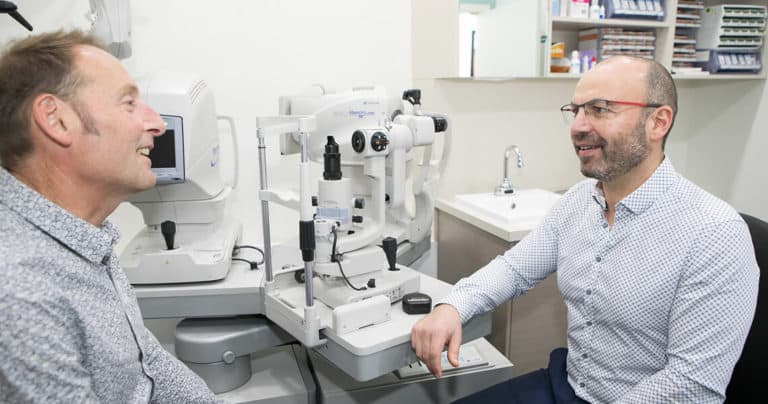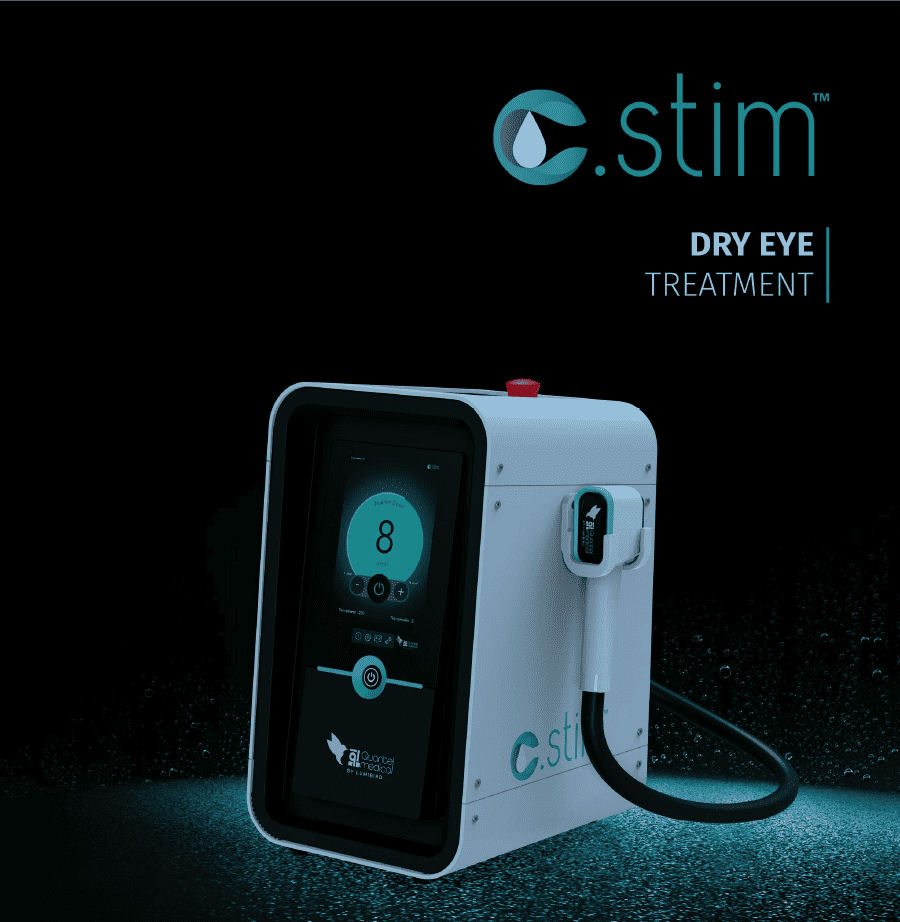Intense Pulsed Light (IPL) Treatment For Dry Eye Information Consent Form
It has been recommended by your optometrist at Canterbury Eyecare that you receive Intense Pulsed Light (IPL) treatment for Dry Eye Disease. Dry Eye Disease is a very common condition caused by multiple factors. In most cases, it is related to Meibomian Gland Dysfunction that affects the eyelids and/or lacrimal gland dysfunction.
What are the current solutions for dry eye treatment?
Treatments include heating of the eyelids with a heat pack, eyelid hygiene, tear substitutes (artificial tears, gel), prescription anti-inflammatories or immunosuppressants and IPL therapy. IPL treatment can replace the need for daily heat pack treatment and in some cases reliance on lubricant drops and lid hygiene.
What are the mechanisms of action of IPL therapy?
The IPL therapy is administered using a device that generates a light flash. The IPL system has been designed to suit many skin types. The light transmitted on the skin has several actions:
- It stimulates the parasympathetic nerve and accelerates the metabolism of the Meibomian Glands and lacrimal glands.
- It reduces skin (i.e. rosacea) and eyelid (i.e. Blepharitis or Demodex) inflammation.
The results of clinical studies on IPL technology have reported:
- Enhancement of the tear film quality
- Improvement of many symptoms: sensation of dryness, foreign body sensation in the eye, itchiness, sensation of burning, eyestrain, blurred vision, sensitivity to light, watery eyes, pain.
As with any treatment, some people will respond better than others, however we recently conducted an in-practice trial and found overly positive results, consistent with the wider research. In our study of a small cohort of patients we found:
Overall 92% found any improvement in dry eye post treatment, and 85% of patients would have a 6 month repeat treatment and would recommend this treatment to someone experiencing dry eye symptoms.
73% of patients had improvement in discomfort sensations.
64% of patients had improvement in end of day discomfort.
55% of patients had improvement in dryness.
73% of patients had improvement in dryness at end of day.
55% of patients had improvement in wateriness.
What is the treatment procedure?
IPL is a therapeutic option to potentially complement other treatment solutions. It is a quick and simple treatment consisting of 4 light flashes to the upper cheek and temples over 4 sessions spaced 7-15 days apart. Research shows that symptoms may improve only after after the third or fourth session. To maintain effectiveness a re-treatment is recommended every 6 months. It is a safe and minimally invasive treatment however throughout the procedure itself you may experience some discomfort which passes quickly.
IPL treatment can be performed in approx. 30 minutes. The cost for IPL treatment incurs a fee (no medicare rebate) as well as a standard short consultation fee (medicare rebate available if eligible).
In our trial, patient experiences of the procedure itself were positive. With patients saying “the procedure was very quick, the gel and glasses were not uncomfortable. The area around my eyes felt warm but no flicking or discomfort” and “the whole procedure was very comfortable… there was always enough gel on my face, the pulses had a slight burning sensation as expected and the gland squeezing afterwards wasn’t too uncomfortable.”
What are the contraindications?
The IPL system cannot be used if you:
- Have injured, burnt or infected skin
- Are pregnant or breastfeeding
- Have had exposure to artificial UV radiation, or use of a self-tan product within the two weeks prior to initial treatment and any subsequent treatments
- Are undergoing botox or collagen injections*
- Are on any medications or having treatment which causes photosensitivity**
- Have moles, tattoo, keloid scars or birthmarks near areas to be treated (cheek and temples) or have medical conditions like lupus or xeroderma
The IPL treatment must only be performed in conjunction with a dermatologist if you have a medical history of facial cancer, vitiligo and psoriasis.
You must inform your optometrist of all your ongoing medical treatments and/or any newly started treatment(s) during the IPL therapy, as well as any changes to your health during this treatment.
How do I prepare for treatment?
For the 2 weeks prior to treatment it is advised to:
- Avoid sun exposure, fake tan or tanning creams and tanning beds.
- Avoid any irritants to your skin such as any products (creams) containing Retin-A, retinol, benzoyl peroxide, glycolic/salicylic acids, astringents, or Vitamin C.
- Cease any photosensitizing medications**
Please attend your appointments without make-up, skincare or lotion on your face.
How do I care for my skin after treatments?
After each treatment avoid sun exposure and use sunscreen SPF 30+ or higher for the 2 days after treatment as tanning may enhance melanin regeneration causing unwanted hyperpigmentation.
Avoid exfoliating, picking or scrubbing while the skin is healing. You can apply cold washcloth to treated area if required but avoid ice packs.
Make-up can be applied post treatment as long as the skin is not inflamed, irritated or broken. It is recommended to use moisturiser if applying makeup after treatment.
Contact us if you experience any persistent effects such as itching or irritation of the treated skin.
Consent to IPL Treatment
Consultation Fees
Existing Patient Consultation: $96.00
Medicare Rebate: $32.40
Referred New Patient Initial Consultation: $118.00
Medicare Rebate: $66.15
IPL Device Fee: $225
No Medicare Rebate
Medicare rebates dependent on date and type of last eye examination.
*Botox Injections:
IPL is not recommended within the first 2-3 weeks after recent botox injections in the same facial area. Botox injections are safe 3-7 days after an IPL treatment.
**Extensive list of photosensitising medications:
Neuroleptics (Antipsychotics): Prochlorperazine, Haloperidol, Thioridazine, Thiothixene, Fluphenazine, Promethazine, Piperacetazine, Trifluoperazine, Clorprotixene, Trimeprazine, Chlorpromazine, Perphenazine, Triflupromazine
Antidepressants: Doxepin, Isocarboxazid, Desipramine, Trimipramine, Imipramine, Protriptyline
Antimicrobials
Antibiotics: Doxycycline, Cinoxacin, Demeclocycline, Oxytetracycline, Griseofulvin
Sulfa drugs: Sulfasalazine, Sulfamethoxazole, Sulfamethizole, Sulfametoxadol
Combo: Sulfadoxine-pyrimethamine
Antiparasitic Drugs: Bithionol, Pyrvinium pamoate
NSAIDs (Anti-inflammatories): Phenylbutazone, Sulindac, Piroxicam, Naproxen, Ketoprofen, Carprofen
Oral Contraceptives: Examples: Ortho-Novum, Norinyl, and others
Other Medications and Chemicals: Disopyramide, Aminobenzoic acid, Carbamazepine, 6-methylcoumarin (in perfumes, aftershaves, sunscreens)
Acne Medications: Isotretinoin, Tretinoin
Antineoplastic Drugs (Chemotherapy): Dacarbazine, Fluorouracil, Methotrexate
Anticonvulsants: Phenytoin, Paramethadione, Trimethadione
Diuretics: Cyclothiazide, Metolazone, Chlorothiazide, Quinethazone, Hydrochlorothiazide, Furosemide, Trichloromethiazide, Amiloride, Bendroflumethiazide, Polythiazide
Antihistamines: Diphenhydramine, Cyproheptadine
Hypoglycemics (Diabetes drugs): Glyburide, Chlorpropamide, Acetohexamide, Glipizide, Tolbutamide, Tolazamide
Miscellaneous: Benzocaine, Chloroquine, Captopril, Amiodarone, Diethylstilbestrol, Myochrysine (Gold salt)

